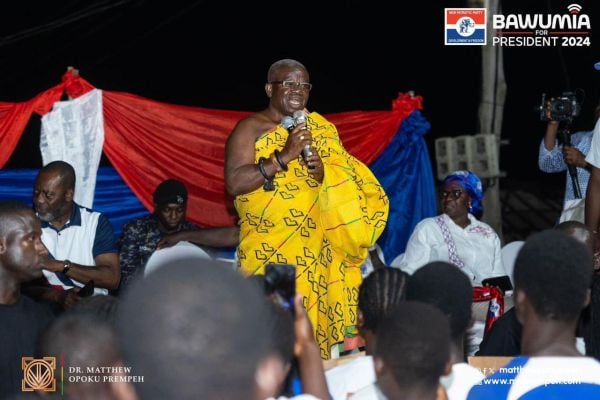Former Local Government Minister Kojo Adjei Darko, a member of the New Patriotic Party (NPP), has publicly criticized former President John Mahama and the National Democratic Congress (NDC) for their narrow campaign focus on food security. During a rally in Chiraa alongside NPP Vice Presidential Candidate Dr. Matthew Opoku Prempeh, Adjei Darko articulated that electoral campaigns should address a multitude of pressing national issues rather than being confined to a single topic. He invoked the saying, “Man must not live by bread alone,” to underscore his belief that while food security is indeed critical, the NDC’s singular focus on it signals a lack of preparedness to govern effectively. The former Minister urged voters to consider candidates who can articulate and tackle a range of significant issues affecting the country.
Adjei Darko highlighted that the NPP is committed to addressing a broader spectrum of challenges, including economic development, healthcare, infrastructure improvement, and job creation. He portrayed the NDC’s campaign strategy as inadequate, suggesting that it reflects a limited understanding of the complexities Ghana faces. According to him, by concentrating predominantly on food security, the NDC is failing to present a comprehensive vision for the future of the nation. The stark contrast he drew between the two parties served as an appeal to voters to recognize the depth and breadth of issues that must be addressed in governance rather than solely focusing on immediate concerns.
In further defending the NPP’s platform, Adjei Darko pointed to the qualifications and capabilities of their presidential candidate, Dr. Mahamudu Bawumia. He asserted that Bawumia’s extensive experience in both government and party positions equips him to effectively address Ghana’s national challenges. Adjei Darko stressed that Bawumia’s track record in championing strong policies positions him as a suitable leader who is committed to expanding upon the developments initiated by President Nana Akufo-Addo. These endorsements were intended to bolster voter confidence in Bawumia as a candidate who could elevate governance beyond superficial campaign promises focused merely on food.
The former MP for Sunyani West lamented that the NDC’s campaign is overly reliant on a single narrative, warning that their media advertisements heavily emphasize food-related issues at the expense of other critical topics. He suggested that this approach portrays a lack of awareness regarding the multifaceted challenges confronting the nation. By declaring that the NDC appears disinterested in the broader socio-economic landscape of Ghana, Adjei Darko argued that their campaign fails to inspire confidence in their readiness to govern. Such observations were meant to rally support for the NPP by framing its agenda as more substantive and reflective of the nation’s needs.
Adjei Darko’s criticisms are rooted in a broader distinction that he perceives between the NPP and the NDC, particularly regarding the approach and substance of their respective campaigns. While the NPP seeks to engage the electorate on multiple developmental fronts, the NDC’s fixation on food security is depicted as a simplistic response to the electorate’s needs. He framed this disparity as a critical factor for voters to consider when evaluating whom to support in upcoming elections. Ultimately, he urged the electorate to reject the NDC’s limited vision and embrace what he views as the NPP’s comprehensive strategy for national governance.
In conclusion, Adjei Darko’s remarks point to a fundamental belief in the necessity of a well-rounded political strategy that encompasses various aspects of governance. He positioned Dr. Bawumia as a leader who embodies this holistic approach, rooted in his experience and commitment to addressing the country’s diverse challenges. By emphasizing the need for comprehensive governance, Adjei Darko’s rhetoric aims to galvanize support for the NPP while critiquing the narrow focus of the NDC’s campaign. His call to action encourages voters to consider the long-term implications of their choices, advocating for leadership that recognizes and responds to the complexities of national development beyond immediate concerns like food security.


